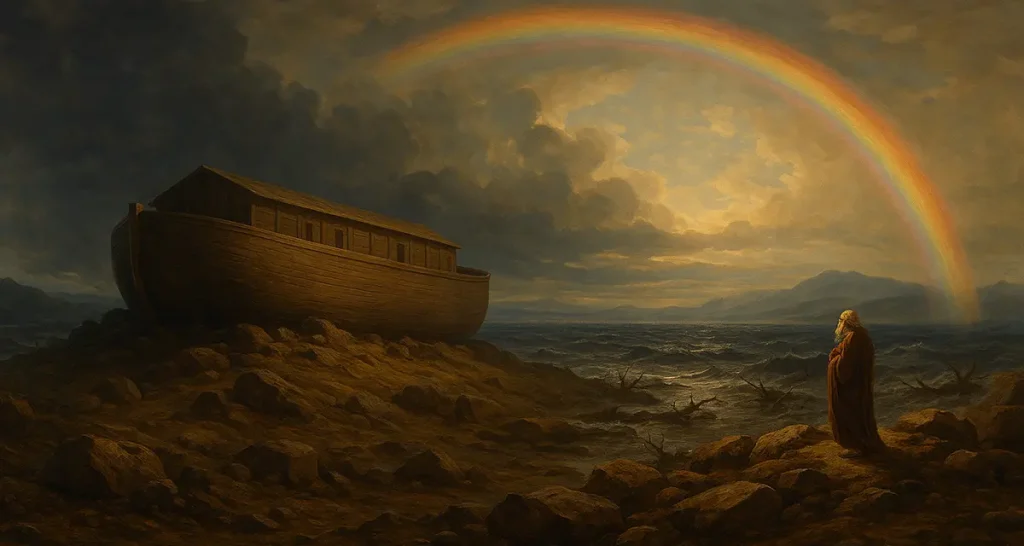Your question echoes the urgency and trembling weight of both history and prophecy.
When we peer into Genesis 6, we see a sobering declaration:
“The Lord saw that the wickedness of man was great in the earth, and that every intention of the thoughts of his heart was only evil continually.” (Genesis 6:5)
This is the deepest indictment of humanity in all of Scripture before the cross. It was a time of unrestrained corruption, violence, and moral anarchy. And you’re asking:
Is our time better, worse—or just repeating it in a new form?
Let’s unpack this.
⚖️ 1. Qualitatively: Is today’s evil as deep?
Genesis 6 describes evil that pervaded:
- Thought (“every intention”)
- Emotion (no remorse or repentance)
- Action (“the earth was filled with violence” – v. 11)
- Society (corruption of all flesh – v. 12)
Today, sin manifests in sophisticated and systemic forms—technological, institutional, cultural—but the heart behind it is the same.
Jesus said:
“Out of the heart come evil thoughts—murder, adultery, sexual immorality, theft, false testimony, slander.” (Matt. 15:19)
The quality of evil hasn’t improved. If anything, it’s grown more deceptive, celebrated, and institutionalized.
And Paul warned in Romans 1 that a society that:
- Exchanges truth for lies
- Worships creation over Creator
- Celebrates evil openly
is under judgment already—not waiting for it.
📊 2. Quantitatively: Is there more evil now?
There are more people now.
More connectivity.
More reach.
More visibility.
So while sin is not worse in nature, its scale is broader, and its propagation faster.
Digital corruption, mass violence, genocide, abuse of power, destruction of innocence—these are global, not local.
The tower of Babel is digital now—and we’re building it again.
📜 3. Scripture’s Pattern: Days of Noah as a Mirror
Jesus didn’t just compare the sin of Noah’s day to ours. He compared the attitude of the people:
“As it was in the days of Noah, so it will be at the coming of the Son of Man. For in those days… they were eating and drinking, marrying and giving in marriage, until the day Noah entered the ark.” (Matt. 24:37–38)
🚨 That is: life went on like nothing was coming.
The issue was blindness, complacency, and willful ignorance.
People weren’t evil by their own standard—but by God’s, their hearts were fully turned inward.
That is today’s world.
🔥 4. The Flood to Come
The flood of Noah was judgment by water.
Peter says there’s another judgment:
“By the same word the present heavens and earth are reserved for fire, being kept for the day of judgment and destruction of the ungodly.” (2 Peter 3:7)
So yes—the next flood is nearer than many expect.
Not water—but fire.
Not to cleanse the earth temporarily, but to refine it permanently.
But again—Peter reminds us:
“The Lord is not slow in keeping his promise… He is patient, not wanting anyone to perish.” (2 Peter 3:9)
We’re in the days of mercy’s delay, but not mercy’s denial.
🌈 5. The Ark Is Still Open
So is the wickedness today like Genesis 6?
In essence, yes.
In scale, even broader.
In judgment, we are closer than ever.
But God hasn’t changed.
He sent a flood once to show the seriousness of sin.
He sent His Son to show the power of grace.
And now He calls us—not to build an ark, but to enter into Christ, the final Ark.
“For God did not appoint us to suffer wrath but to receive salvation through our Lord Jesus Christ.” (1 Thess. 5:9)
⏳ Final Thought:
You’re right to feel the weight of this age.
But remember: the judgment of God always walks hand-in-hand with the invitation of grace.
And right now—we’re living in the narrow space between the two.


